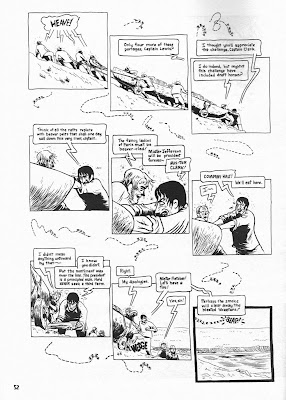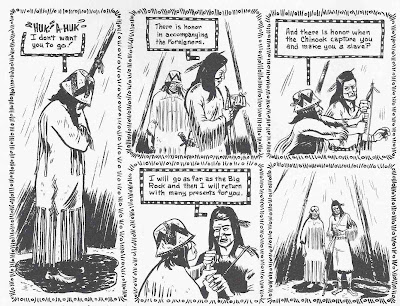By Adrian Neibauer
Staff Writer
STORY REVIEW
Can you really teach any topic or subject using graphic novels? Absolutely!
LEWIS & CLARK is a perfect example of a high-quality graphic novel
that is a wonderful accompaniment to any classroom unit on exploration and the
West. Using a thorough bibliography of scholarly recountings of Lewis and
Clark’s journey to find a water route to the Pacific Ocean, Nick Bertozzi
successfully weaves history and story to create a captivating historical
narrative.
In 1804, Meriwether Lewis and William Clark embarked on one of the
most famous journeys in American history. LEWIS & CLARK is historical graphic
novel that tells their amazing adventure from St. Louis through the Louisiana
and Oregon Territories, finally ending two years later at the Pacific
Ocean.
ART REVIEW
Nick Bertozzi’s style is vastly different from other mainstream
graphic novels published by First Second. When reading, you can’t help but feel
as though you are reading a modernized Tintin adventure by Hergé. It is not
surprising then that Bertozzi admits to both Hergé and Jack Kirby as childhood
inspiration for his self-taught artistic talents.
LEWIS & CLARK is such a uniquely illustrated graphic novel. Completely in black and white, Bertozzi uses
clever page layouts and light versus dark to show movement over time.
 |
| This page shows how Bertozzi plays with movement throughout the panels. Notice how the mosquito flits outside each panel finally being slapped at the end of the page. |
 |
| I particularly love how Bertozzi's panels become decorative when focusing on the Native Americans. It gives their lives a sense of beauty that is often lost when discussing Manifest Destiny. |
IN THE CLASSROOM
I would definitely include LEWIS & CLARK in my stack of textbooks
to teach the American West. Since this
story is historical fiction, I would make sure my students have background
knowledge of Meriwether Lewis and William Clark before using Bertozzi’s graphic
novel. Although there is one very subtle reference to having sex with a Native
American, there is no reason why any fifth through eighth grade teacher cannot
use this graphic novel in their classroom.
Teachers can use LEWIS & CLARK to teach a variety of reading
strategies, but I feel the best use of this book comes from the story and its
characters. Bertozzi chooses to focus his narrative on Meriwether Lewis. He is
a patriotic visionary, who is unforgiving and demanding throughout his journey.
He eventually goes insane and commits suicide at the end of the novel. Although
many students might find these character traits to be negative (and quite
disturbing), it is exactly these features that propel Lewis and Clark toward
the Pacific Ocean despite innumerable difficulties. Lewis offers teacher and students a great
example in character study and the fall of a hero.
LEWIS & CLARK touches on issues of slavery and diplomacy as the
American “Corp of Discovery” travel westward. In specifically discussing Native
Americans, Bertozzi does a wonderful job giving each tribe and each character a
purposeful history. For example, Sacagawea is depicted as cunning and
intelligent despite her forced escort to Lewis and Clark. So many times,
textbooks depict all Native Americans and merely savages. Bertozzi writes the
Native Americans as intelligently dealing with the French, British, and
Americans differently based on what they have learned in the past. Bertozzi
even writes the dialogue with unusual detail giving the reader what the Native
American hears based on the language
differences. All of these things can be
discussion and mini-projects in a history classroom.
MORE INFORMATION
Author & Illustrator: Nick
Bertozzi
Format: Paperback
Pages: 137
Color: Black and White
Publisher: First Second
ISBN: 978-1-59643-450-9
MY RECOMMENDATION
I highly recommend LEWIS & CLARK for any history classroom grades 5 and up. There is one subtle reference to having sex
with a Native American, and Lewis does commit suicide at the end of the book. The
sexual reference is so subtle, however, that I feel most students would miss it
altogether. The suicide is also subtle,
but cleverly illustrated for effect.










No comments:
Post a Comment